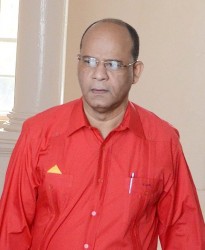With nary a word on Thursday night, the opposition voted against the second reading of a bill intended to change name of the Guyana Police Force to the Guyana Police Service.
Government members described the move by APNU and the AFC as vindictive and Minister of Home Affairs Clement Rohee said that the bill would be brought back to the National Assembly following the next elections. “…If we have to wait until next election to bring the bill back, so shall we…” he said prior to the bill going to a vote.
The opposition on Thursday also voted against the second readings of the Evidence (Amendment) Bill 2013, the Motor Vehicles and Road Traffic (Amendment) Bill 2013 and the Fire Service (Change of Name) Bill 2013, in keeping of their policy of non-cooperation with the minister. APNU and the AFC passed a motion of no confidence against Rohee last year but their calls for his resignation or sacking have been resisted.

No one from the opposition spoke on the Police (Change of name) Bill 2013 and the government lost the vote 27 to 29 when the votes were tallied. The changing of the police force’s name was aimed at portraying a better image of the organisation and government members said it would benefit Guyanese.
In their effort to get the bill passed, Rohee along with other members of the government side reiterated that it was not about just changing the name of the police force but replacing the word ‘force’ with ‘service’ will see a transformation in the organisation.
Rohee said that the modernisation of the police forces around the world is something that is taking place. He said he believes that a name change would be good for Guyana and everyone should be united on it. The name change, he said, is not something of a cosmetic nature but one that must be able to deliver a better service to the people.
The minister added that the change is not only influenced by external forces but agents of change within the GPF and it is consistent with one of the recommendations of the Disciplined Services Commission and the national sentiment of the country. “When we speak about the police service we are not only talking about a name change per se. We are talking about an institution that has experience transformation,” Rohee said.
Attorney-General Anil Nandlall also spoke in support of the bill. He said that changing the name of the police force will change the perception of the organisation.
But according to Reverend Kwame Gilbert, there is no consequential or material difference a name change would have on the broader scheme of law enforcement. Changing the name of the police force should be seen as a new identity and persona, he said.
The PPP member added that police forces throughout the world need the support of citizens to assist in making communities safe and secure but this is only possible when there is a service oriented force. Gilbert said the word ‘force’ gives the wrong connotation and that ‘service’ gives a better feeling. He said they are aware of this recognized need and “the name, I believe, creates a better sense of service and community…”
Gilbert also noted that the image they are seeking to create is one where people can see policemen as people they can partner with in service and protection. After the opposition voted against the bill, Rohee and other members of the government called a press conference to express their dissatisfaction with the opposition’s decision. He told reporters that the bill was not about him; instead it was about his party and the government. The behaviour of the opposition was unbelievable, Rohee said, while other members of the government described the opposition’s decision as vindictive.




